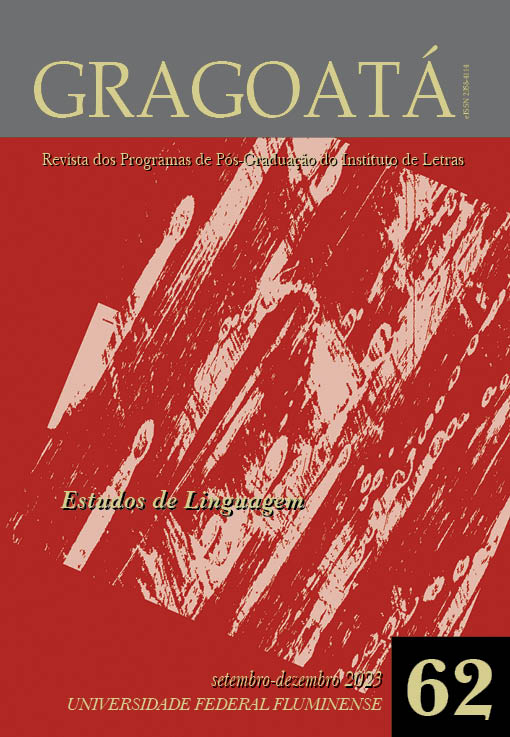Interação Fictiva como exemplificação em discurso direto: ensino-aprendizagem de português como língua estrangeira
DOI :
https://doi.org/10.22409/gragoata.v28i62.57476.ptMots-clés :
Linguística Cognitiva, Fictividade, Discurso Direto Fictivo, Português como Língua EstrangeiraRésumé
Este artigo investiga instâncias de Interação Fictiva (IF) em discurso direto como exemplificações de argumentos e explicações, no ensino-aprendizagem de Português como língua estrangeira. Adotam-se autores da Linguística Cognitiva: Talmy (2000), para se tratar da fictividade; Fillmore (1982), da noção de frame; Langacker (2008), de frame atencional; Fauconnier (1994, 1997), de projeção de espaços mentais; Sanders e Redeker (1996), de perspectiva; Pascual (2002, 2006, 2014), da IF como forma de organizar pensamento, gramática e discurso; Rocha (2020, 2022), da dimensão fictiva do discurso direto em relação à factiva. Quanto à metodologia, analisam-se dados de duas aulas em uma turma de nível superior da disciplina de Português como Língua Estrangeira. Assume-se uma abordagem metodológica baseada em corpus (corpus-based) e guiada por corpus (corpus-driven) (MCENERY; HARDIE, 2012; TOGNINI-BONELLI, 2001), possibilitando que os dados tenham maior protagonismo, considerando-se uma categoria já estabelecida. A análise qualitativa revela ocorrências de Exemplificação em Discurso Direto Fictivo visando a promover no discurso conceptualizações de condição adversa, estado de contemplação, estado de desorientação, reconhecimento repentino ou insight e explicação didática. Os achados demonstram que o fenômeno é produtivo em contexto de sala de aula, ocorrendo na fala docente e discente com propósitos comunicativos voltados para a argumentação e para a explicação. Além disso, revelam que as ocorrências apresentam um caráter performático, linguística e prosodicamente marcado, tornando a manifestação mais vívida, como um convite aos interlocutores a se projetarem em coordenadas espaço-temporais distintas da cena comunicativa corrente, objetivando convencimento e clareza no processo de ensino-aprendizagem.
Téléchargements
Téléchargements
Publiée
Numéro
Rubrique
Licence
(c) Copyright Gragoatá 2023

Ce travail est disponible sous la licence Creative Commons Attribution 4.0 International .
AUTORIZAÇÃO
Autores que publicam em Gragoatá concordam com os seguintes termos:
Os autores mantêm os direitos e cedem à revista o direito à primeira publicação, simultaneamente submetido a uma licença Creative Commons Atribuição 4.0 Internacional (CC BY 4.0), que permite o compartilhamento por terceiros com a devida menção ao autor e à primeira publicação pela Gragoatá.
Os autores podem entrar em acordos contratuais adicionais e separados para a distribuição não exclusiva da versão publicada da obra (por exemplo, postá-la em um repositório institucional ou publicá-la em um livro), com o reconhecimento de sua publicação inicial na Gragoatá.
A Gragoatá utiliza uma Licença Creative Commons - Atribuição CC BY 4.0 Internacional.











